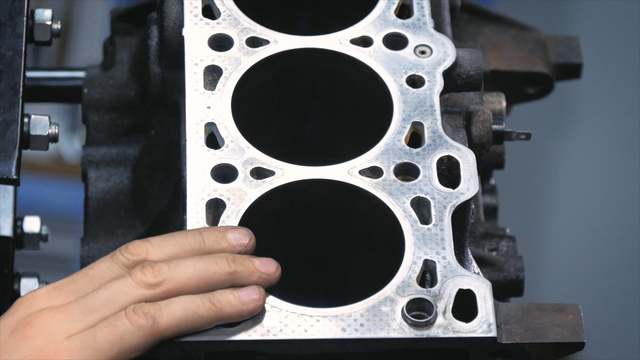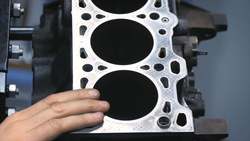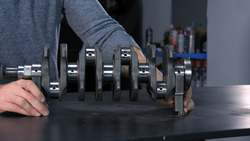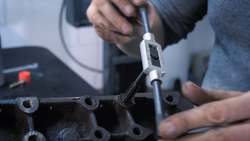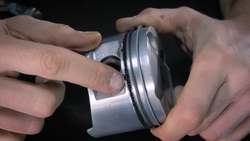Driving for Economy
The Video Course teaches you everything about modern cars.
Ever since the oil crisis of the early 1970s, everybody has become more interested in fuel economy. Motorists have been forced to take more notice of it because fuel has become relatively expensive, and car manufacturers have answered this by concentrating more of their research and development on engine efficiency and aerodynamics. By and large, cars are more economical than they have ever been, but there is one person who can have a more dramatic effect than a whole team of engineers - you.
Although it is to be encouraged, however, driving for economy must never be allowed to come before considerations of safety. It is quite conceivable that a driver can find himself in a potentially dangerous situation, perhaps through being unwilling to accelerate briskly when it is necessary, simply because he has allowed petrol saving to become more important than planned, systematic and constructive advance d driving. Nevertheless, the basic principles of advanced driving tend to go hand in hand with economical motoring: anticipating hazards well in advance, braking in good time and using the accelerator smoothly and progressively all contribute to economical driving.
Do's and don'ts
There are a number of points to remember when trying to make the most of each precious gallon of fuel:
The car you buy
The type of car you run, as much as the way in which you drive it, will influence fuel consumption so there is no point in buying a car with a larger or more powerful engine than you need. Look at the choice of engine sizes available for the model you choose and try to work out which suits you best, remembering that a smaller unit will not always be more economical. Since a smaller engine has to work harder in certain conditions, it can end up using as much fuel in practice as a larger but under-worked engine. Most cars these days have five-speed gearboxes, but if a five-speed is only optional for your chosen model it is worth asking yourself whether the extra cost would be worthwhile for the sake of `long-legged' — and therefore more economical — cruising.
Compare the fuel consumption figures of the cars on your short list before making your decision. EC rules oblige every manufacturer to quote fuel consumption figures for a standard urban cycle , steady 56mph and steady 75mph, so these can act as a guide. These figures appear in some of the motoring magazines, in manufacturers' brochures and in the Institute of Advanced Motorists' own Milestones magazine. But do not be misled by a particularly good steady 56mph figure, for this would be almost impossible to attain in normal traffic conditions; the steady 75mph figure is likely to be closer to what you can reasonably expect in day-to-day driving.
By the way, you may have wondered why 75mph is always quoted when our national speed limit (on dual-carriageways and motorways) is 70mph. The answer is that 75mph equates to 120kph (a legal speed in most European countries), a figure which the EC has deemed suitable as a fuel consumption yardstick. Road tests in motoring magazines usually state the fuel consumption achieved through the duration of the test, but bear in mind that this will reflect plenty of hard driving off public roads to obtain performance figures; magazine figures will invariably be less than you will achieve, but they can be useful in comparing one car with another.
Unleaded fuel
At the time of writing, a tax concession makes unleaded fuel cheaper than normal leaded grades, and this situation seems likely to continue at least until regulations require all new cars to run on unleaded fuel. Apart from playing your own part in reducing atmospheric pollution, therefore, you can also save money by running your car on unleaded fuel. Before doing so, however, check with your dealer whether your car can already run on unleaded fuel, or whether it needs adjustment first. The cost of any adjustment will be recouped fairly quickly, but do not be surprised if this is not possible because a few cars cannot be altered to take unleaded fuel. There may be a slight power loss, but you are unlikely to notice it.
Diesel or petrol?
The increasing popularity of diesel-engined cars shows that many motorists choose them because of their longer engine life and greater economy. The disadvantages are that diesels are noisier (although modern diesels have become much quieter), offer less performance and cost more to buy. Diesel fuel is cheaper and goes as much as 40 per cent further, but generally speaking the higher purchase price of diesel cars makes them suitable only for drivers covering a high mileage. You will have to weigh up the costs for yourself before making your decision, but do not dismiss a diesel on the grounds that it is noisy and smelly until you have tried one for yourself — you may be surprised by the refinement of the best modern diesel cars.
Service
Following the manufacturer's recommended service intervals religiously will keep your car's engine running in the best state of tune. Maladjusted ignition and carburettors , as well as worn spark plugs , can affect fuel economy adversely. A normal service should also include a check of the brakes and wheel alignment ; any problems here can add to the resistance which your car's engine must overcome to propel it.
Economy devices
There was a time when accessory economy devices were popular, but motor manufacturers have made such strides in improving engine efficiency that these are really not worth considering nowadays. The only accessory which you might find useful is an 'engine efficiency meter ' or vacuum gauge , an instrument which measures the depression in the inlet manifold and translates this into a simple display of information on a dial. By keeping the accelerator opening balanced against road and engine speed, you can keep the needle in the sector of the dial which shows that you are making best use of the fuel, although you should never forget considerations of safety.
The best economy device is free — your right foot. You can save a great deal of fuel by avoiding excessive acceleration, easing off well before any hazard and feathering the accelerator back at cruising speeds. A car will cruise comfortably along a level road with a surprisingly small throttle opening. Putting your foot further down will bring only a slight increase in speed and much heavier fuel consumption.
Summary
The Ultimate Car Mechanics video course
Learn everything about modern cars from our new video series.
Learn more >-
We build a Mazda MX5 Miata from scratch
We start by tearing down and then rebuilding the whole car.
-
Every part explained
There's ridiculous detail on every part. Clearly and easily explained.
-
All modeled in 3D
We've created the most detailed 3D model ever produced so we can show you everything working.
